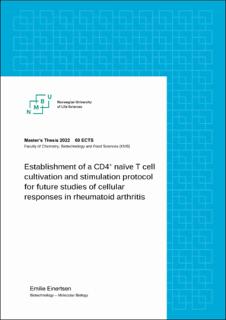| dc.contributor.advisor | Heinicke, Fatima | |
| dc.contributor.advisor | Lie, Benedicte A. | |
| dc.contributor.advisor | Carlsen, Harald | |
| dc.contributor.author | Einertsen, Emilie | |
| dc.date.accessioned | 2022-09-27T10:37:36Z | |
| dc.date.available | 2022-09-27T10:37:36Z | |
| dc.date.issued | 2022 | |
| dc.identifier.uri | https://hdl.handle.net/11250/3021714 | |
| dc.description.abstract | Rheumatoid arthritis (RA) is a complex autoimmune disease that primarily causes inflammation in the synovial membrane of joints in the body. It is a multifactorial disease that involves a combination of genetic, epigenetic, and environmental factors contributing to the progression of the disease, with cigarette smoking being the most well studied environmental risk factors. There is currently no cure for RA, but patients are usually treated with low doses of disease-modifying antirheumatic drugs (DMARDs), such as methotrexate (MTX) in order to slow down the progression of the disease.
The pathogenesis of the disease is still not completely understood, but naïve CD4+ T cells are believed to be important mediators in the development of the disease. The aim of this thesis was to optimize the cell cultivation process of CD4+ naïve T cells in response to treatment, in order to be able to conduct further research on the cells. An optimized CD4+ naïve T cell protocol for stimulation of cells with MTX and nicotine was established. In order to cultivate T cells in vitro, additional stimulation with a CD3/CD28 T cell activator is recommended for the cells to expand and proliferate favorably. Flow cytometry was used to monitor the purity of the cells during isolation and shows the majority of the CD4+ naïve cells were observed to develop into memory/activated cells over time, and by day 6 of cultivation the naïve cell population was almost completely lost. The cell cultivation protocol was therefore shortened to only 2 days, with treatment of the cells on day 0 of the cultivation process and harvesting cells on day 2.
The relative cell proliferation of the CD4+ T cells when treated with various MTX and nicotine concentrations were examined using a WST-1 cell proliferating assay. The concentrations of further interest were found to be cells stimulated for 48 hours with 0.005 μM, 0.01 μM and 0.05 μM of MTX giving approximately 100%, 60% and 40% cell proliferation, respectively. The nicotine concentration of interest was 10 μM as it did not affect cell proliferation and it was comparable to previous work carried out on CD8+ T cells. The establishment of this cultivation and stimulation protocol allows for investigating the response of CD4+ naïve T cells to treatment with MTX and exposure to nicotine in further detail. | en_US |
| dc.description.abstract | Rheumatoid arthritis (RA) is a complex autoimmune disease that primarily causes inflammation in the synovial membrane of joints in the body. It is a multifactorial disease that involves a combination of genetic, epigenetic, and environmental factors contributing to the progression of the disease, with cigarette smoking being the most well studied environmental risk factors. There is currently no cure for RA, but patients are usually treated with low doses of disease-modifying antirheumatic drugs (DMARDs), such as methotrexate (MTX) in order to slow down the progression of the disease.
The pathogenesis of the disease is still not completely understood, but naïve CD4+ T cells are believed to be important mediators in the development of the disease. The aim of this thesis was to optimize the cell cultivation process of CD4+ naïve T cells in response to treatment, in order to be able to conduct further research on the cells. An optimized CD4+ naïve T cell protocol for stimulation of cells with MTX and nicotine was established. In order to cultivate T cells in vitro, additional stimulation with a CD3/CD28 T cell activator is recommended for the cells to expand and proliferate favorably. Flow cytometry was used to monitor the purity of the cells during isolation and shows the majority of the CD4+ naïve cells were observed to develop into memory/activated cells over time, and by day 6 of cultivation the naïve cell population was almost completely lost. The cell cultivation protocol was therefore shortened to only 2 days, with treatment of the cells on day 0 of the cultivation process and harvesting cells on day 2.
The relative cell proliferation of the CD4+ T cells when treated with various MTX and nicotine concentrations were examined using a WST-1 cell proliferating assay. The concentrations of further interest were found to be cells stimulated for 48 hours with 0.005 μM, 0.01 μM and 0.05 μM of MTX giving approximately 100%, 60% and 40% cell proliferation, respectively. The nicotine concentration of interest was 10 μM as it did not affect cell proliferation and it was comparable to previous work carried out on CD8+ T cells. The establishment of this cultivation and stimulation protocol allows for investigating the response of CD4+ naïve T cells to treatment with MTX and exposure to nicotine in further detail. | en_US |
| dc.language.iso | eng | en_US |
| dc.publisher | Norwegian University of Life Sciences, Ås | en_US |
| dc.rights | Attribution-NonCommercial-NoDerivatives 4.0 Internasjonal | * |
| dc.rights.uri | http://creativecommons.org/licenses/by-nc-nd/4.0/deed.no | * |
| dc.title | Establishment of a CD4+ naïve T cell cultivation and stimulation protocol for future studies of cellular responses in rheumatoid arthritis | en_US |
| dc.type | Master thesis | en_US |
| dc.description.localcode | M-BIOTEK | en_US |

